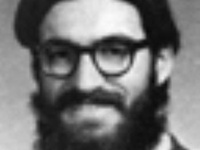“She said, ‘Rick looked so relaxed, completely comfortable in the present, he looked like a Buddha.’ ‘That’s why I love him,’ Joy said. The truth was,” Allen chuckles, “I had no idea what was going on. I seemed the ideal of non-attachment because I was going to flunk the course.”
Joy, now a radio host and attorney, remembers her former college sweetheart as a sharp intellect with often soft edges.
“He’s one of the brightest people I’ve ever known, and one of the sweetest,” she says. Despite his academic enthusiasm, she says she doesn’t recall much talk about life after college. “I remember him being more of an abstract thinker. He wasn’t real career-oriented.”
Allen’s thesis was emblematic of his wide interest in “philosophy of mind” and his academic strengths. It was entitled, “Knowledge, Mind, and World: an Exercise in Descriptive Epistemology.” Even though he says it was “extraordinarily broad,” it earned Allen a magna cum laude degree.
‘What Am I Meant to Study?’
While the Harvard of the late 1970s was a comfortable fit for Allen, allowing him to cultivate “a combination of intellectual seriousness and playfulness,” he wonders if the result was a wealth of knowledge that may have been too broad.
“I indulged every intellectual whim and didn’t specialize much,” he says. “I was always doing well in school because I was doing what I wanted. And that persisted through Harvard.”
He speaks with the softness and delicacy of a patient philosopher, meting out meaning, carefully navigating over a busy landscape of thought. In college, he says that navigation involved “jumping over the hurdles that society associates with eventual success.” But Allen never saw academic life as a race for professional achievement.
“For me, I just loved jumping hurdles. Or, I didn’t experience them as hurdles but as the search for truth. I think that, all around me, people had a much more practical, get-ahead orientation. I was just experiencing this happy coincidence between what I most desired to do—to learn—and what society was pushing me to do,” he says. “It was a very un-alienated condition.”
After graduating, Allen eschewed the job market and traditional professional school path and instead gleefully travelled to England’s Sussex University for a one-year Masters degree program in philosophy. His return stateside in 1979 found him working as a research assistant at Harvard’s Graduate School of Education and in New York City, where he took a much-needed breather from the academy.
“I hung out with some artists in the East Village, went out to clubs regularly,” he says of his heady city nights. “I didn’t even unpack my books. I had a year of not any reading at all.”
Allen soon decided he needed to “do something useful” someplace outside of New York. So he took a job as a teacher at Kutama College, an elite high school in Zimbabwe. Aside from teaching science and math and coaching the swim team, Allen helped the Science Club to win a national competition for a psychological study on attitudinal changes during high school. Ultimately the teaching experience was as edifying as his years as an undergraduate.
“It was a really fun and challenging adventure,” he says, “I relished the feeling of being in a whole new culture and making a contribution.”
Allen returned to New York less enchanted with academic life than he had been before. But downtown reading groups on Marx and Baudrillard reminded him of his cerebral bent. “I thought, if I’m naturally gravitating to these reading groups, I might as well go to grad school in philosophy.”
“What Does One Do With a Ph.D. in Philosophy?”
Read more in News
Pataki: 'Yale is Going to Crush Harvard'













